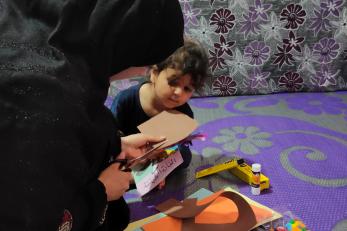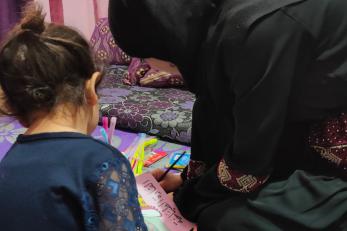Mercy Corps’ support of Young Mothers’ empowerment in Za’atari Camp

In Za’atari camp, around 79,000 Syrian Refugees have been living in exile for the past eight years, of which 7% (around 5,484) are adolescent girls. The majority of this age group benefits from one of the diverse Mercy Corps psychosocial support programs such as the Young Mothers project under the ISHRAK Program.
Girls and women living in the Za’atari camp are at greater risk of economic pressure, physical and emotional distress, and in some cases, gender-based violence (GBV), all because they share caravans with limited space, with male family members, which can trigger violence issues. The COVID‑19 lockdown has made girls and women even more vulnerable to pressures from male figures of the family, with limited freedom of movement, control, and privacy, under circumstances of physical and psychological stress, as well as limited access to social protection services.
To address issues that hamper women’s and girls’ development and empowerment in Za’atari Camp, Mercy Corps is reaching out to young mothers between 13 and 21 years old, as well as mothers who got married before the age of 18 through the ‘Young Mothers’ program. This program is helping raise awareness, not only of female participants but also of their husbands, mothers-in-law, and other dominant figures of their family, on the importance of educating young married women on positive parenting, childcare, sexual and reproductive health and rights, and other topics that empower them to support themselves and their children.
With the continued support from SHELL and the Source of Hope Foundation, Mercy Corps continued to reach out and serve the most isolated and under-reached women living in Za’atari and Azraq Camps.
Zeinab Mohammed, is 19 years old and she got married without proper consultation on marriage at a very early age. She got divorced after two years and is now raising the one child that she had in this marriage with the support of her family. She notes that: “the incidents I have been through have not limited my courage to resist my failed marriage experience, I have been able to continue my life, raising my child with support from my parents. I recently participated in the ‘Young Mothers’ program that brought me hope. I have learned about a lot of new topics and issues such as coping with stress and methods of communication with children; this knowledge is helping me in my life.”

While Mercy Corps was conducting sessions for young mothers through home visits before the COVID‑19 pandemic, to adapt to the new context and needs, Mercy Corps staff decided to connect with participating young mothers virtually by creating WhatsApp groups, which are allowing even the most isolated mothers to have a safe space to interact with their peers. This approach came as a response to participants’ needs and suggestions.
Zeinab shares: “through my enrollment in the Young Mothers Program, I have learned about new methods to cope with stress, child development stages, ways to communicate with my child, and non-violent methods of raising and maintaining my health and the health of my child. Thank you to Mercy Corps for this program that is increasing people’s knowledge and experience.”
Young Mothers is part of Mercy Corps Jordan’s Ishrak program. Ishrak, meaning ‘Engagement’, is a family strengthening project that provides psychosocial support to fortify bonds between family members in stressful situations. We work in the Azraq and Za’atari refugee camps, providing creative ways for caregivers and children to connect, play, and build positive relationships. Each of the program components is designed to work together towards the broader goal of increasing family resilience to extreme stress and creating an environment in which children are protected and able to thrive. By focusing holistically on all generations of the family, including elders and non-parental caregivers, the program supports whole communities’ resilience. The program draws on the latest evidence from neuroscience and attachment theory to underpin all activities.